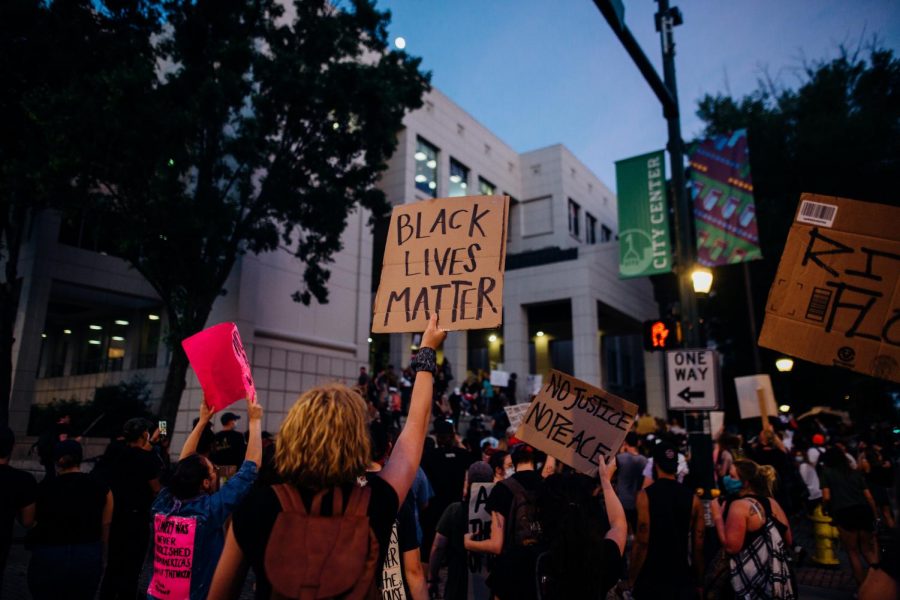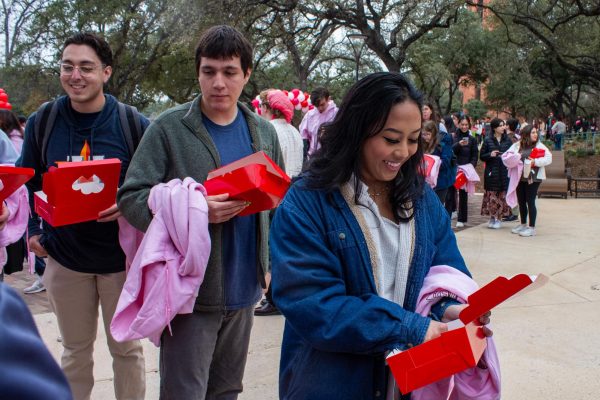Community reacts to Chauvin verdict, highlight police violence by SAPD
Chauvin’s conviction described as “accountability” not justice
Content warning: This story includes mentions of police brutality and murder.
Last week, Derek Chauvin, former police officer of the Minneapolis Police Department, was convicted on all three charges of second-degree unintentional murder, third-degree murder and second-degree manslaughter. The verdict sparked impassioned reactions across the nation, with many referring to Chauvin’s convictions as “accountability,” not justice. For the Trinity community, Chauvin’s verdict appeared to be viewed through a similar lens; the convictions brought temporary relief but many stated that true justice would mean that George Floyd would still be alive today.
The former cop murdered Floyd back in May of 2020. Floyd’s murder, caught on footage by then 17-year old Darnella Frazier, resulted in months of protest and calls for Chauvin and the three other police officers involved to be convicted. Less than half an hour after the verdict was released to the public, Trinity University president, Danny Anderson, sent out a campus-wide email regarding the jury’s decision.
“The verdict rendered today against former Minneapolis police officer Derek Chauvin for the death of George Floyd brings a sense of justice. It does not bring closure. The brutal death of Mr. Floyd was not an isolated incident. It is part of a long history of violence that disproportionately affects Black men and communities of color,” wrote Anderson.
Chauvin was taken to a facility in Stillwater, Minnesota after his bail was revoked. Joshua Anaya, junior and secretary of the Young Democratic Socialists of America (YDSA), said that he believes Chauvin’s verdict brought a sense of relief, but there’s still work to be done.
“Now, more than ever, we need to eye the contradictions between the murderous, oppressive actions of state institutions and what true justice and accountability look like. While there is a lot of relief following yesterday’s verdict, it is not a stopping point. The underlying conditions allowing for anti-Black violence in the first place are still operating with great strength in our society. Accountability will come with abolition and community restoration completely away from policing, which everyone has a role in fighting for,” said Anaya.
Jahnavi Nikkam, Trinity Diversity Connection’s dialogue chair, also described feeling “relief” after hearing the verdict.
“When I heard the verdict that Chauvin was found guilty, I felt relief that there was finally some accountability. But that is different from justice. Justice would find a way to prevent this from happening again, but that is yet to occur. A guilty verdict is not a substitute for policy change, as AOC [Alexandria Ocasio-Cortez] put it,” said Nikkam.
Police brutality and misconduct in Bexar County
We want to offer a warning that the following incidents may be difficult and distressing to read. We’ve withheld some gruesome details about the incidents but have linked sources that provide the full story. Reader discretion is advised.
The nationwide protests against police brutality that were rekindled in the summer of 2020 and continued into 2021 have brought special attention to police brutality within the San Antonio Police Department (SAPD).
Since 2015, the Texas Justice Initiative has documented 104 shootings that involved police officers in Bexar County. Twenty-three of these shootings took place in 2020 alone, making it the county’s deadliest year for deaths involving police officers. Four months into 2021, five of these shootings have already taken place. Of all the civilians killed by police officers since 2015, 52% have resulted in death, and 94% of the civilians were male.
In November of 2019, two SAPD police officers were fired after an excessive force incident. In July of last year, the San Antonio Police Officer Association gained national attention when three of their former officers, who were fired for misconduct, were hired again after an arbitrator overturned the initial ruling. More information about the reasons behind their firing can be found here.
Last August, the murder of Damian Daniels by law enforcement also resulted in “fierce protests” in the San Antonio community. He was killed only three months after Floyd when Bexar County’s sheriff deputies responded to a call about a mental health emergency.
In September of 2020, the San Antonio City Council passed a $2.9 billion budget that included “a boost in funding for the San Antonio Police Department.” This came despite local activists calling for the defunding of SAPD.
Victor Sanchez, a man who had mental health issues was killed by SAPD last September. Sanchez was killed in his home after six officers fatally shot at him. Sanchez’s story resembles that of Damian Daniels, and highlighted a real problem within police departments everywhere, one that Sanchez’s mother talked about in an interview.
“What if your wife or your husband had a mental issue? Would you expect for the cops to come over here and then start firing and killing — killing your loved one?”











Hannah Wolf • Apr 29, 2021 at 1:51 pm
Hi there, thanks for the article. I think I caught a mistake.
The article reads “Of all the civilians killed by police officers since 2015, 52% have resulted in death” which doesn’t make sense. Do you mean all the civilians shot by police officers?